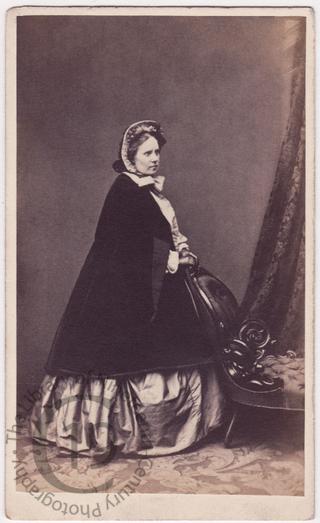
Hon Theresa Yelverton
The Honourable Mrs Yelverton (1827-1881) was the heroine of the famous 'Yelverton Marriage Case' that gripped the public's imagination at the beginning of the 1860s.
Born Maria Theresa Longworth at Cheetwood, Lancashire in 1827, the seventh child of a Manchester silk merchant, Theresa was educated at a convent in Staffordshire and with the Ursulines at Boulogne, where she converted to Roman Catholicism. On leaving, she spent two years in Italy where she completed her education. One of her sisters was married a M. Le Favre at Boulogne, and it was while returning from a visit to her in 1852 that Theresa first met Major William Charles Yelverton, the eldest son of Lord Avonmore, and began a correspondence with him. During the Crimean War, Theresa was a nurse at Constantinople where the two met for a second time and became engaged. She returned to England in 1857 and on 12 April of that year, Yelverton read aloud the Church of England marriage service at her lodgings in Edinburgh ‘according to Scotch law.’ The bride not being satisfied with this, they were again married in August of the same year by the Rev Bernard Mooney, this time at the Roman Catholic chapel at Kilbroney near Rostrevor in Ireland. A year later the Major tired of his wife and deserted her at Bordeaux, doing his best to persuade her to go to New Zealand, although promising to follow her there. This she refused to do and on 26 June 1858 Yelverton married publicly Emily, the widow of Professor Edward Forbes, ignoring his first marriage.
On 31 October 1859 Mrs Yelverton sued for restitution of conjugal rights in the London probate court but the court decided it had no jurisdiction. In February 1861, in a trial lasting eleven days, an Irish court found that both marriages were valid. The Scottish Court of Session also upheld the Scotch marriage on 19 December 1862, but this judgment was reversed by the House of Lords on 28 July 1864. An appeal was rejected on 28 October 1868 and a subscription was raised in Manchester on Mrs Yelverton’s behalf.
After this Mrs Yelverton lived chiefly abroad, from about March 1880 at Pietermaritzburg, Natal, where she died on 13 September 1881 and was buried in the Church of England cemetery there.
Mrs Yelverton published several works, the earlier ones concerned entirely with her legal predicament (Martyrs to Circumstances, published in 1861, and The Yelverton Correspondences, published 1863). These were followed by Zanita, A Tale of the Yosemite (1872), Teresina Peregrina, or Fifty Thousand Miles of Travel around the World (1874) and Teresina in America (1875). One reviewer of Teresina Peregrina wrote: ‘Her narrative is so interesting that we regret the excrescences of bad taste, which are irritating and divert attention from the real merit and the unflagging liveliness of the book.’
Photographed by A. Brothers of Manchester.
Code: 122432




